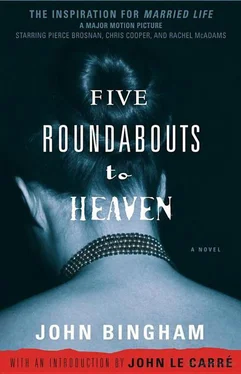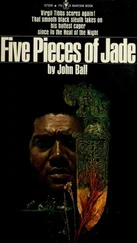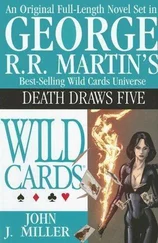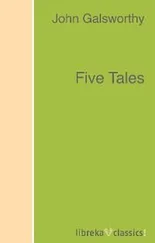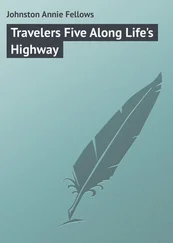John Bingham - Five Roundabouts to Heaven
Здесь есть возможность читать онлайн «John Bingham - Five Roundabouts to Heaven» весь текст электронной книги совершенно бесплатно (целиком полную версию без сокращений). В некоторых случаях можно слушать аудио, скачать через торрент в формате fb2 и присутствует краткое содержание. Жанр: Криминальный детектив, на английском языке. Описание произведения, (предисловие) а так же отзывы посетителей доступны на портале библиотеки ЛибКат.
- Название:Five Roundabouts to Heaven
- Автор:
- Жанр:
- Год:неизвестен
- ISBN:нет данных
- Рейтинг книги:4 / 5. Голосов: 1
-
Избранное:Добавить в избранное
- Отзывы:
-
Ваша оценка:
- 80
- 1
- 2
- 3
- 4
- 5
Five Roundabouts to Heaven: краткое содержание, описание и аннотация
Предлагаем к чтению аннотацию, описание, краткое содержание или предисловие (зависит от того, что написал сам автор книги «Five Roundabouts to Heaven»). Если вы не нашли необходимую информацию о книге — напишите в комментариях, мы постараемся отыскать её.
Five Roundabouts to Heaven — читать онлайн бесплатно полную книгу (весь текст) целиком
Ниже представлен текст книги, разбитый по страницам. Система сохранения места последней прочитанной страницы, позволяет с удобством читать онлайн бесплатно книгу «Five Roundabouts to Heaven», без необходимости каждый раз заново искать на чём Вы остановились. Поставьте закладку, и сможете в любой момент перейти на страницу, на которой закончили чтение.
Интервал:
Закладка:
Therefore he had to be away from the flat until 11.30 or midnight. He did not wish to be with people to whom he was largely indifferent, but with Lorna, who loved him and who would unknowingly give him the strength to tide over the hour between 10.30 and 11.30.
So he took the road out of London, the Kingston Bypass, and navigated the five traffic roundabouts which led to Thatchley, and recalled how he used to think of them, once, as the Five Roundabouts to Heaven.
He assured himself that he still did, of course, and that the depression which was weighing him down was due to nothing more than the nervous tension which the day, not unnaturally, had produced in him.
He left the office promptly at 5.30. The bitter cold of the previous few days had continued. Occasional flurries of snow were still falling, and the headlights of the continual stream of cars approaching London dazzled him, so that he was compelled to drive slowly and with care.
The whine of the windscreen wiper, an old-fashioned type, added to his depression. The thing squeaked protestingly on the windscreen, and twice the blade faltered and stopped while the mechanism continued to moan ineffectually.
Once, he spoke out loud, above the noise of the engine and of the windscreen wiper and of the wind: “It’s not when you die that matters-it’s how. What are a few years more or less in the infinite, limitless realm of Time?”
And once he said: “It’s better this way. It’s better for her to avoid the suffering and the loneliness. It’s a form of mercy murder, that’s all. Mercy killing is almost condoned by society for physical suffering, why not for mental? Why not for the suffering of the mind and spirit?” It was his old argument, brought out to comfort him on his way.
But were they Five Roundabouts to Heaven? Or did they lead to Hell? They did, if the Scriptures were right. But the Scriptures, the Ten Commandments, the thou-shalt-not-kills and thou-shalt-not-
covets, were a mere set of simple rules to maintain order among a wandering desert tribe. Moses was an old fraud who had gone up into a mountain and come down again claiming Divine inspiration for some rule-of-thumb laws which he had thought up in his goatskin tent.
Did God exist? If He did, what was He thinking now of him, of Philip Bartels, scurrying through the snow and the traffic because he, Philip Bartels, needed the company of a woman to prevent him thinking too much about a deed so logical, a deed so humane?
If the deed were so humane, did he need distractions for his thoughts? A deed, a deed, distractions from a deed. And this foul deed shall smell above the earth, that’s what he had recited at school. Smell above the earth. With carrion men groaning for burial. Cassius, he had been. Not Royal Caesar. But yesterday the word of Caesar might have stood against the world.
But yesterday the word of Philip Bartels might have stood against nothing. Nor tomorrow. Nor the day after. Did he expect Lorna to make a man out of him? Could he expect that? And one laughed in his sleep, and one cried “Murder”; but that was in Macbeth, a play about another murderer.
Another? Wherefore another? One cried “God bless us,” and “Amen” the other. Duncan’s guards. I could not say “Amen” when they did say “God bless us.” Wherefore could I not pronounce “Amen”? I had most need of blessing. Wherefore said I another murderer? Macbeth and Caesar. The killer, the victim.
He had been Cassius, the killer, but that was at school. Cassius at school; and would Beatrice’s spirit, ranging for revenge, come hot from-heaven, if there were a heaven? And with Ate by her side cry, “Havoc, and let loose the dogs of war”? The windscreen wiper stuck again, but the blade turned upon its axis, saying: “Havoc-havoc-havoc.”
Bartels drew the car in to the side of the road until the shivering in his limbs had died away. Perhaps he was, in fact, getting a cold. Perhaps, all unknowingly, he had told Miss Latimer the truth. If he had caught a chill, if he were confined to his bed, how would that affect things?
Not at all, except that he would have to nurse himself. Alone. In some cheap hotel bedroom. He was in Cobham now, and caught sight of a hotel, and eased the car along to it, and went in and had a large whisky and soda.
He felt so much better that he ordered another. He had time for it, if he drank it quickly, as he had done the first one.
He raised the glass and was about to do so, when he paused.
He must not drink it quickly. He must drink it slowly, unconcernedly. He had already acted unwisely in ordering a second large one, in drinking the first so hurriedly.
He must linger over this one, as though he had all the time in the world, and not a care in the world, because if things, somehow, went wrong, and if his photograph were to be published in the papers, and if the barman saw it-what then? He imagined how it would go in court.
“And you were on duty at the bar of your hotel on 26 February, is that right?”
“That’s right, sir.”
“How do you manage to recall the date so accurately?”
“Because it was so bitter cold that night, sir.”
“And I believe that while you were on duty, somebody came in and ordered a whisky and soda, a large one. Do you see that person anywhere in court?”
“Yes, sir.”
“Well, point him out to the jury, please.”
“It was him. In the dock.”
“How do you manage to remember him so well?”
“I remember thinking that he had a very wide mouth for his size, sir. And wore specs with gold side-pieces. Rather old-fashioned specs, I thought. Spectacles, I should say.”
“Remember anything else about him?”
“He looked pale, sir.”
“He looked pale, did he? Anything else?”
“Well, kind of hot and bothered.”
“What exactly do you mean by ‘kind of hot and bothered’? Try to be a little more precise for the jury, will you?”
“Well, kind of upset. As though he was afraid.”
“Agitated and distressed, would you say?”
“Yes, sir.”
“What made you think that, apart from him looking pale?”
“Well sir, he ordered a double whisky, and drank it very fast, kind of gulped it down. And then he ordered another, and gulped that down, too, and went straight out. I could understand him gulping the first one, sir, owing to the weather and so on. But I remember thinking it a bit odd about the second. ’That’s queer,’ I said, ‘two doubles like that, quick as a flash.’ That’s why I remember him, really. Whisky costing what it does, most gentlemen like to linger over it a bit.”
“So you would definitely say that he looked agitated and distressed?”
“Yes, sir, I would.”
“Thank you.”
Then Counsel for the defence, of course. Twisting and turning and wriggling. Trying to make out it was quite normal for a man to look pale on a cold night and gulp down two large, expensive, double whiskies, in about three minutes, and go out into the cold again. All that sort of nonsense.
Quibbling and quibbling about identification. Haven’t you seen lots of men with large mouths? Is it so rare that you see a man with spectacles like that? You admit you have seen his picture in the papers? So you didn’t have much trouble about picking him out in court, did you? You admit that?
You admit this, you admit that, you admit the other.
Yes, sir. No, sir. Three bags full, sir.
And on and on and on.
So he must drink it slowly. Very slowly, when all the time he wanted to be with Lorna. To find strength in her steady blue-grey eyes, tranquillity in gazing at her brow and at her calm, rather squarely cut jaw.
But he must be careful. First, Miss Latimer: he had snapped at Miss Latimer. Now, he had nearly attracted attention by drinking too much too quickly. Miss Latimer in court, plump and bewildered, the perkiness knocked out of her, awed by her surroundings:
Читать дальшеИнтервал:
Закладка:
Похожие книги на «Five Roundabouts to Heaven»
Представляем Вашему вниманию похожие книги на «Five Roundabouts to Heaven» списком для выбора. Мы отобрали схожую по названию и смыслу литературу в надежде предоставить читателям больше вариантов отыскать новые, интересные, ещё непрочитанные произведения.
Обсуждение, отзывы о книге «Five Roundabouts to Heaven» и просто собственные мнения читателей. Оставьте ваши комментарии, напишите, что Вы думаете о произведении, его смысле или главных героях. Укажите что конкретно понравилось, а что нет, и почему Вы так считаете.
